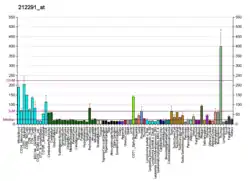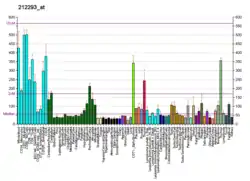HIPK1
Homeodomain-interacting protein kinase 1 is an enzyme that in humans is encoded by the HIPK1 gene.[5]
Function
The protein encoded by this gene belongs to the Ser/Thr family of protein kinases and HIPK subfamily. It phosphorylates homeodomain transcription factors and may also function as a co-repressor for homeodomain transcription factors. Alternative splicing results in four transcript variants encoding four distinct isoforms.[5]
References
- GRCh38: Ensembl release 89: ENSG00000163349 - Ensembl, May 2017
- GRCm38: Ensembl release 89: ENSMUSG00000008730 - Ensembl, May 2017
- "Human PubMed Reference:". National Center for Biotechnology Information, U.S. National Library of Medicine.
- "Mouse PubMed Reference:". National Center for Biotechnology Information, U.S. National Library of Medicine.
- "Entrez Gene: HIPK1 homeodomain interacting protein kinase 1".
- Kondo S, Lu Y, Debbas M, Lin AW, Sarosi I, Itie A, Wakeham A, Tuan J, Saris C, Elliott G, Ma W, Benchimol S, Lowe SW, Mak TW, Thukral SK (Apr 2003). "Characterization of cells and gene-targeted mice deficient for the p53-binding kinase homeodomain-interacting protein kinase 1 (HIPK1)". Proceedings of the National Academy of Sciences of the United States of America. 100 (9): 5431–6. Bibcode:2003PNAS..100.5431K. doi:10.1073/pnas.0530308100. PMC 154362. PMID 12702766.
Further reading
- Ishikawa K, Nagase T, Suyama M, Miyajima N, Tanaka A, Kotani H, Nomura N, Ohara O (Jun 1998). "Prediction of the coding sequences of unidentified human genes. X. The complete sequences of 100 new cDNA clones from brain which can code for large proteins in vitro". DNA Research. 5 (3): 169–76. doi:10.1093/dnares/5.3.169. PMID 9734811.
- Kim YH, Choi CY, Lee SJ, Conti MA, Kim Y (Oct 1998). "Homeodomain-interacting protein kinases, a novel family of co-repressors for homeodomain transcription factors". The Journal of Biological Chemistry. 273 (40): 25875–9. doi:10.1074/jbc.273.40.25875. PMID 9748262.
- Ecsedy JA, Michaelson JS, Leder P (Feb 2003). "Homeodomain-interacting protein kinase 1 modulates Daxx localization, phosphorylation, and transcriptional activity". Molecular and Cellular Biology. 23 (3): 950–60. doi:10.1128/MCB.23.3.950-960.2003. PMC 140690. PMID 12529400.
- Kondo S, Lu Y, Debbas M, Lin AW, Sarosi I, Itie A, Wakeham A, Tuan J, Saris C, Elliott G, Ma W, Benchimol S, Lowe SW, Mak TW, Thukral SK (Apr 2003). "Characterization of cells and gene-targeted mice deficient for the p53-binding kinase homeodomain-interacting protein kinase 1 (HIPK1)". Proceedings of the National Academy of Sciences of the United States of America. 100 (9): 5431–6. Bibcode:2003PNAS..100.5431K. doi:10.1073/pnas.0530308100. PMC 154362. PMID 12702766.
- Song JJ, Lee YJ (Nov 2003). "Role of the ASK1-SEK1-JNK1-HIPK1 signal in Daxx trafficking and ASK1 oligomerization". The Journal of Biological Chemistry. 278 (47): 47245–52. doi:10.1074/jbc.M213201200. PMID 12968034.
- Colland F, Jacq X, Trouplin V, Mougin C, Groizeleau C, Hamburger A, Meil A, Wojcik J, Legrain P, Gauthier JM (Jul 2004). "Functional proteomics mapping of a human signaling pathway". Genome Research. 14 (7): 1324–32. doi:10.1101/gr.2334104. PMC 442148. PMID 15231748.
- Li X, Zhang R, Luo D, Park SJ, Wang Q, Kim Y, Min W (Apr 2005). "Tumor necrosis factor alpha-induced desumoylation and cytoplasmic translocation of homeodomain-interacting protein kinase 1 are critical for apoptosis signal-regulating kinase 1-JNK/p38 activation". The Journal of Biological Chemistry. 280 (15): 15061–70. doi:10.1074/jbc.M414262200. PMID 15701637.
This article is issued from Wikipedia. The text is licensed under Creative Commons - Attribution - Sharealike. Additional terms may apply for the media files.





